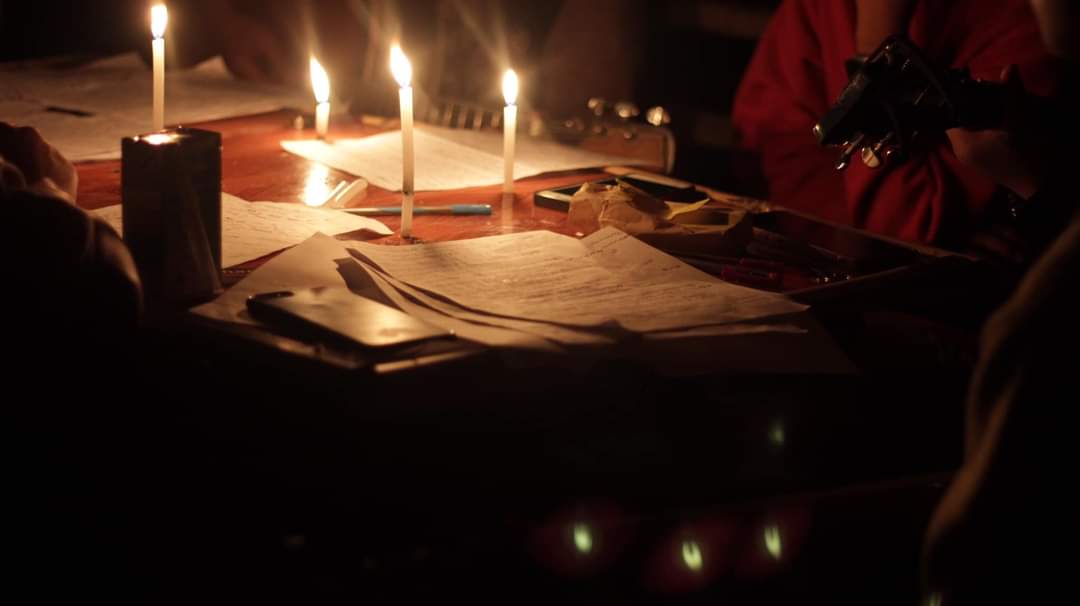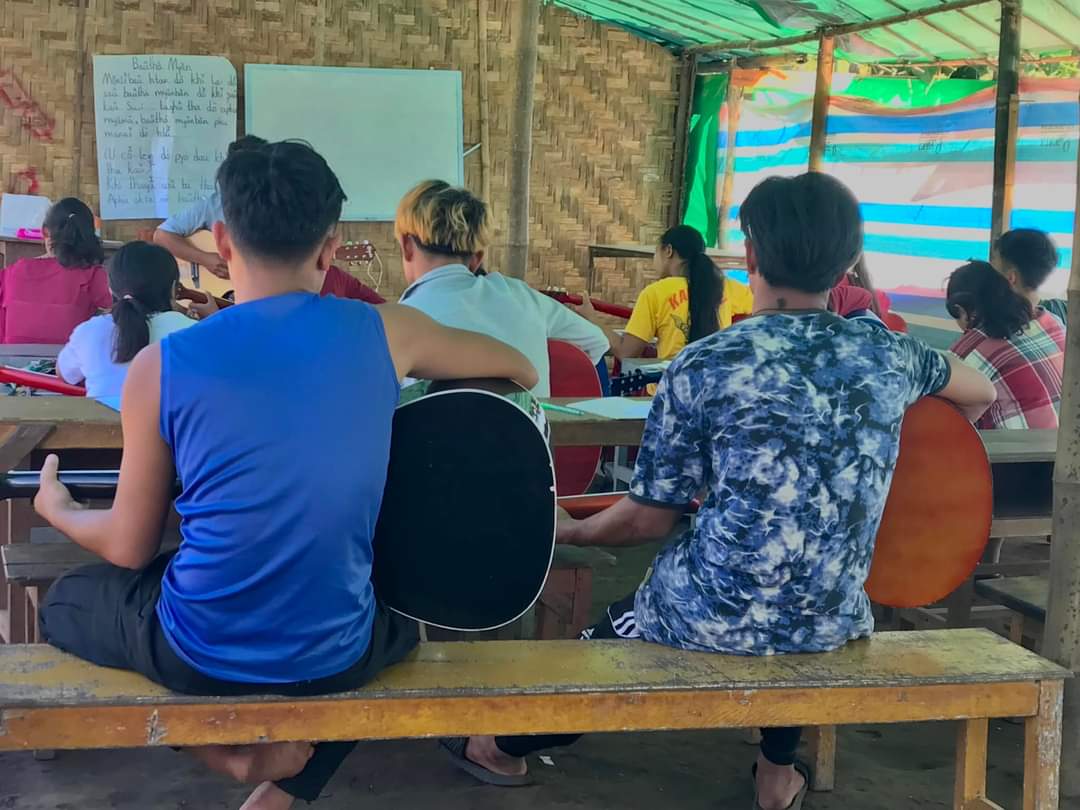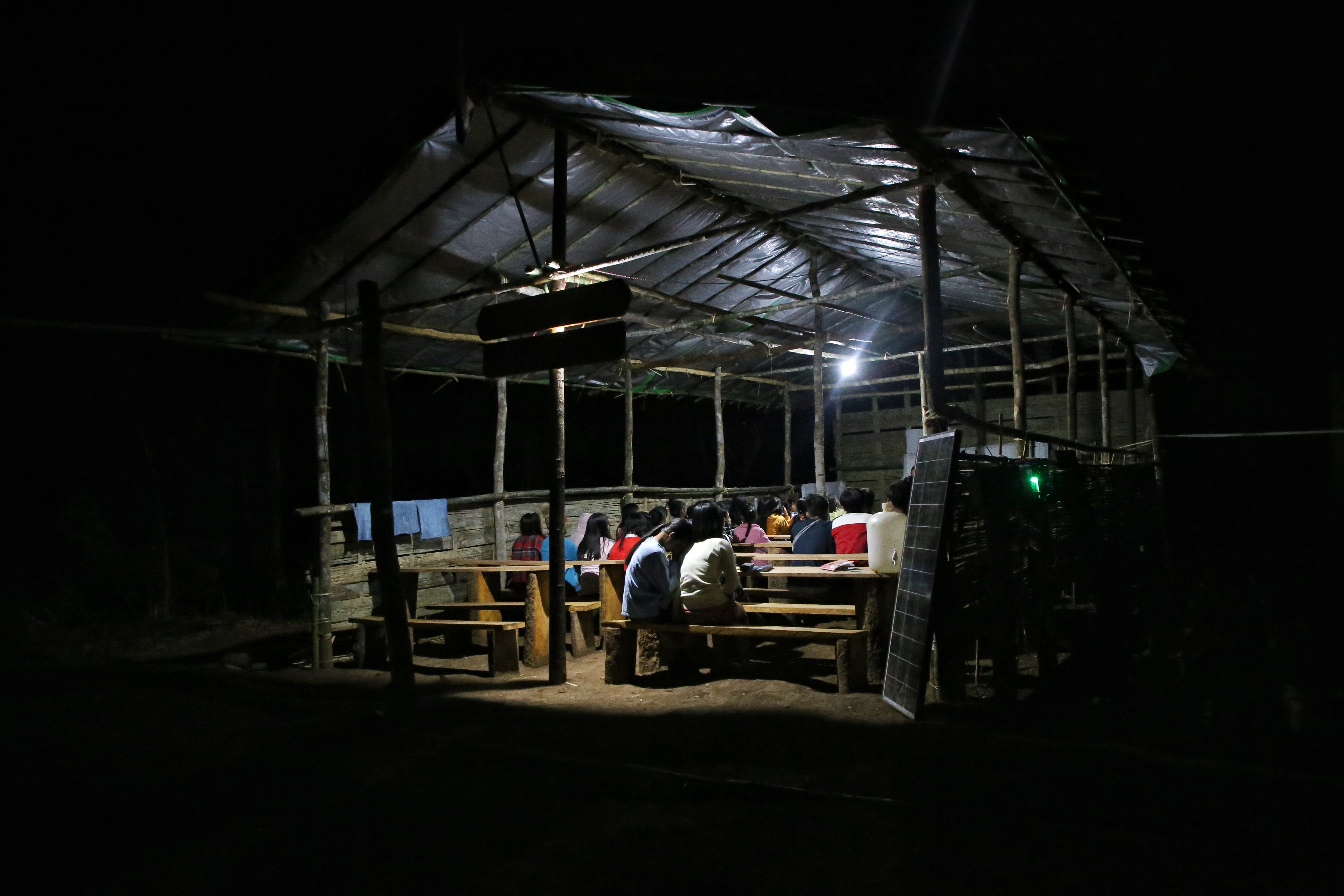
On a morning in March, during a pause in fighting between the military and pro-democracy forces, 60 students gathered secretly in a village in western Myanmar to take their university entrance examinations.
Without internet access, they huddled around portable wireless devices; rather than sitting in classrooms, they crowded into people’s houses. There, they answered two hours of multiple-choice questions on their mobile phones before quietly returning home as if it were an ordinary day.
In reality, however, the day was far from normal.
It marked the culmination of six months of intense studying after two years out of school, all while enduring military-imposed internet shutdowns, active armed conflict, and the risk of military attacks for participating in activities organised by its adversary, the National Unity Government (NUG).
Appointed by elected parliamentarians thrown out of office by the February 2021 coup, the NUG has for the past two years worked to set up parallel governance structures and institutions, as its forces and those allied with it simultaneously resist the military with arms. The military has retaliated with intense violence, often targeting civilians.
In the face of such enormous challenges, communities across the country came together to ensure that the NUG’s exams could go ahead.
“Students, parents and teachers all worked hard for this exam for six months,” said Kyaw, who helped organise the test in his village in Magway region. “All we could do was pray and hope for the best while preparing for the worst … Only after the exam did my anxiety start to calm.”
An alternative
For Kyaw, whose real name, like the other local sources we are not using for safety reasons, helping students to prepare for the test was both a public service and an act of resistance.

A semester away from completing his medical studies when the pandemic shut down schools and universities across the country, Kyaw refused to resume his programme after the coup. Instead, he joined a civil disobedience movement that saw hundreds of thousands of government educators go on strike and millions of students boycott what they termed a “military slave education”.
Most of them still have not returned, while participation in military-administered university entrance exams – also called matriculation – has also plummeted. Last March, only 160,000 young people took the test, compared with 910,000 who took it under the semi-civilian government in 2020. It is typically sat by students aged between 16 and 18.
The NUG’s exams can be taken subject by subject at any time between February and April, and August and October, and to be eligible, students must be at least 17 and have completed at least the second-to-last year of high school before the pandemic. So far, just under 60,000 people have registered for the NUG’s exams according to deputy minister of education Ja Htoi Pan, who described them as “an alternative option” for students to complete their basic education.
Although the NUG plans to release the results in February 2024, the practical implications of passing remain uncertain. So far, although several alternative higher education options have emerged since the coup, Myanmar has only one degree-offering university outside the now military-run system, while no foreign countries yet recognise the NUG as Myanmar’s legitimate government. The NUG has not yet announced whether any international universities will recognise the exam; Ja Htoi Pan told Al Jazeera that it was a “possibility” but did not elaborate further.
Nonetheless, the exam itself forms part of a broader effort by the NUG and other resistance groups to overhaul an education system which had stagnated under a half-century of military dictatorship and had only just begun to undergo reforms under the government of now-jailed elected leader Aung San Suu Kyi.
The exam follows the pre-existing government curriculum, but the questions, designed by the NUG with support from international experts, seek to promote conceptual understanding, practical application of knowledge and creative problem-solving, according to Ja Htoi Pan.
A master’s degree candidate from Myanmar who is conducting research on the NUG’s exams and who spoke on the condition of anonymity for security reasons said that, unlike the previous exam format, the NUG’s questions push the students to go beyond memorising the curriculum material.
Educators and students also said that the NUG test encourages more comprehensive learning.
“You can only get good marks after really understanding the whole concept,” said Kyaw, the volunteer teacher, of the new test.
“It focuses on creative thinking. This kind of exam format is what I want,” added Salai Htun Htun, who took the test in Magway region’s Saw township.
“Before, we memorised everything. Now, there’s no need to memorise to take the test. We only need to understand the concepts.”
In a displacement camp in India’s northeastern border state of Mizoram, Esther from Chin State’s Matupi township said that unlike in the past, she had to “read all the lessons and topics and try to understand all the concepts”.
“I am very determined not to attend and take the exam in a school under the control of the dictators, but I think it would be more convenient if I could take the test after studying each subject in an orderly way like I used to in school,” she said.
Exams under war
While Esther was at least able to take the test from the relative safety of the camp, students back in Myanmar endured immense risks to participate at a time when the military continues to target resistance-affiliated activities. In September of last year, military forces bombed a private school established by striking government teachers in Sagaing region, killing 11 children.
A month later, soldiers decapitated a volunteer teacher at a school operating under the NUG in the Magway region and impaled his head on the school’s gate. Then in April of this year, military forces bombed the opening ceremony of a local administrative body established under the NUG in the Sagaing region, killing at least 160 people.
“Our first challenge was that parents and students were afraid,” said Bo Bo, a volunteer teacher in Sagaing region’s Monywa district who was a government teacher before the coup. “Some students didn’t even join classes for a month,” he added.
In the Magway region, Kyaw described tutoring students in village houses at night and informing them of the test day and location just an hour in advance. “We kept the exam information secret as much as possible, and we didn’t even let the students know where or when they would take it,” he said. “If the news got out, it would cause unwanted problems.”
Educators and students also risked being caught in the crossfire of war. Since the country’s pro-democracy movement began to turn from nonviolent protests towards armed revolution around April of 2021, the military has gone from shooting unarmed protesters to raiding and burning villages and dropping bombs on residential areas, driving more than 1.5 million people to flee their homes.
“When soldiers come to the village, we run. Then we come back and study when they return to their stations in town,” said Kyaw. “Our biggest concern during the exam period was that a military column would bomb us from above or come to our village for an operation.”
Other educators described holding the test in makeshift shelters in the forest, with members of anti-coup resistance forces standing guard.
“We requested the defence teams to conduct systematic scouting during the entire test,” said Salai Alex, a school principal who went on strike in opposition to the coup and coordinated the NUG exam rollout in Chin State’s Kanpetlet township.
In the neighbouring Matupi township, armed clashes interrupted the exam process itself.
“The students who fled to the jungle wanted to take the exam, but they had all fled in different directions,” said Happy New, who oversaw the exam rollout in her township and before the coup was a government teacher.
Working together with other local educators and parents, she reconvened the students at a new location where the local resistance force managed security while the students took the test.
“In that way, we all worked step by step to make the best from the worst,” said Happy New.
Still, she described signs of trauma among her students.
“They faced mental difficulties because they took the exam while avoiding the war, amid the sound of gunfire and explosions,” she said. “There were some medical incidents and emergencies such as falling down, having headaches, or even twitching during exam time.”

Adding to the challenges, the military continues to restrict internet access in about 15 percent of the country, but the exam is only offered online. Although the NUG has arranged portable wireless devices to get around this obstacle, each device can only support 20 to 30 students at a time and there are not enough devices to go around, educators say.
In the Matupi township, there were two functioning devices for several hundred students across six testing sites.
“Some are a day apart by motorcycle, and we still face security concerns,” said Happy New.
Funding shortages are another barrier. Educators are mainly serving on a volunteer basis, while communities cover their room and board. The exam organisers from Matupi township organised a fundraising music concert and football game in Mizoram, India, but according to Happy New, the money has still come up short.
“We see our needs, but we can’t solve them,” she said.
Still, she and others expressed a strong commitment to ensuring the exams go forward.
“In the past, when my grandparents talked about their experience under military rule and how they didn’t have a chance to study, I heard them, but it wasn’t a big deal for me because I didn’t experience it in practice,” she said. “Now, we face it in reality. We must completely destroy this military education system … I will keep standing with the conviction that the military dictatorship must be uprooted.”







